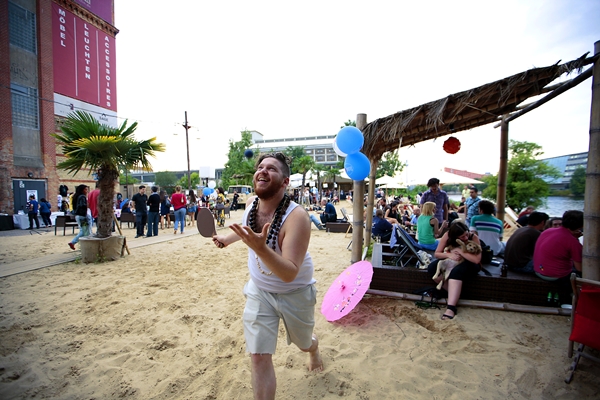Berlin has become a popular destination for young Israelis who enrich the city’s cultural scene. Associations like Habait help to create platforms and organize events where Israelis and Germans who are tired of talking only about the past, meet and celebrate.
It is just shy of two o’clock in the morning and a techno version of Hava Nagila is blasting out of the speakers. A mess of arms and legs is gyrating beneath Israel flags. It is hot and stuffy. The party series running under the Star of David is called ‘Berlin Meschugge’ and it is injecting a splash of Mediterranean spirit into Berlin’s flourishing club scene.
Non-kosher and a-political
The club night is a German-Israeli mélange with a kitschy Middle Eastern pop soundtrack. It is non-kosher and a-political, celebrated by Israelis and Germans who are tired of talking only about the past and instead look to the future.
Berlin, the former epicenter of the Holocaust, a city from which many of their grandparents fled, has become a popular destination for young Israelis in recent years. 18,000 of them have chosen Berlin as their adopted home. Many Israelis who are descendants of Holocaust survivors are entitled to a European passport. The German Embassy in Tel Aviv estimates that it issues around 3,000 German passports each year.
A house for Israeli culture
Nirit Bialer helps Israelis to gain a foothold in Berlin. “I keep getting requests from young people who are looking for a place to stay or a job in Berlin,” she tells us. In contrast to most Israelis, she has been a Berlin fan for many years. It was in 1993 that Bialer first came to Germany as part of a student exchange.
For the last six years, her meet up for young Israelis has been bringing around 40 Israelis and Germans together each month. Together with friends, she also founded the association Habait (The House) a year and half ago. Habait helps to create platforms for Israeli culture in the city. “There is so much wonderful Israeli culture in Berlin which is tagged as something else,” Bialer explains. There are still no official Israeli cultural ‘embassies’ in the mould of Germany’s Goethe Institute or the UK’s British Council.
The main target group for Habait’s events is German speakers and so most of the events – including lectures, concerts, theatrical performances and parties – are held in the local lingo. Indeed, many more Germans than Israelis come to the events.
“Many Germans prefer not to attend the events from the Jewish Community or the Israeli Embassy because they point too much in a certain direction,” Bialer informs us. On the other hand, with Habait “they get a glimpse of Israeli culture through the back door.” Interestingly, the association’s logo is a doorbell and not a house. “It’s because we haven’t found a home yet,” says Bialer.
Not quite New York
However, Berlin is still not a natural home for Israelis. “To live here means learning a lot about yourself. Berlin is not New York – it is a problem if you’re not German,” explains Bialer. Encounters between Germans and Israelis are generally characterized by curiosity but also fear – from both sides. Even with increasing numbers of Israelis absolving semesters at Berlin universities, German DJs playing in Tel Aviv, the weekly radio show in Hebrew, the Hebrew Berlin magazine “Spitz,” or the fact that Israelis learn German and many Germans study Hebrew, a sense of fear remains. It will take time for the historical taboos to soften and mutual inhibitions to thaw further.
“It is as if there is a special spotlight on me,” says Nir de Volff, who has been working as a choreographer in Berlin for ten years. “I see myself first and foremost as an artist. But here I am always the Jew who produces art.” De Volff is in fact promoted as such by the cultural fund of the State of Berlin. “I would appreciate if my art was seen and judged as such – good or not good – regardless of where I come from.”
38-year old de Volff moved to Berlin because he “had a vision”, he wanted to do his thing in the arts. In the meantime, he has learned that this Berlin vision is much more complex than first assumed. “Now I am beginning to understand where I actually live” he says. In Berlin, he has sacrificed spontaneity and happiness. However: “I lead a safe and organized life.”

Nir de Volff’s grandfather does not want to know anything about his life with the Germans, he is a survivor of the Bergen-Belsen concentration camp. “Take from them what they didn’t give to me, what they took away from me,” he instructed. But Nir de Volff does not feel guilty that he lives in the country of the perpetrators. “That would be horrible. I feel good, because I am developing myself here.” His self, that is, the Israeli with the Jewish cultural background, not the Jewish Israeli. Like many Israelis in Berlin, de Volff does not need religion to call himself an Israeli. Needless to say, he does not have much to do with the Jewish Community in Berlin.


